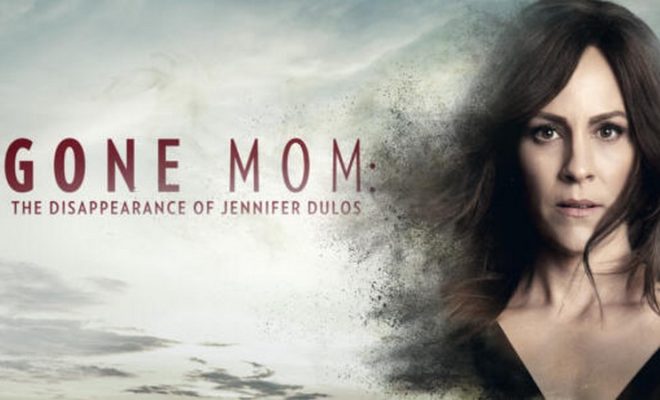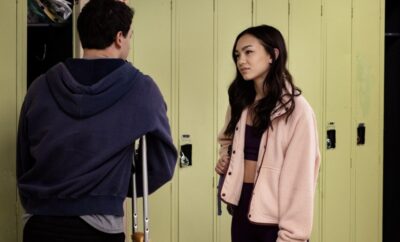
Interviews
Annabeth Gish, Warren Christie, Ilene Kahn Power & Gail Harvey – Gone Mom
By: Lisa Steinberg
Q) Were you familiar with the Dulos case prior to your involvement in the film?
Annabeth Gish: I certainly was. I live here in the States, and I have a lot of friends on the East Coast. And yes, I was very much aware as a mother um, of the story, yes I was.
Warren Christie: I wasn’t. I didn’t really know a lot about it, so to see it start to unfold and really get into the details of it was obviously incredibly shocking. I don’t know how else to put it.
Q) What was it that first attracted you to the roles that made you know that you just had to play them?
Annabeth Gish: Well, for me there were multiple reasons not the least of which is that Jennifer would have been my peer. When I was at Duke, she was at Brown. We’re both the exact same age. I’m a mother, and I think there’s a real resonance to understanding that this kind of domestic violence can occur in any social strata. Whether you’re privileged or not. And I think the story of loving someone and then being surprised with who they actually are is a common one. So, I was, I was. I wouldn’t say I was eager. It was, it was stressful to take on the role, but I wanted to embody this part.
Q) Warren, what was the most challenging part of doing this role?
Warren Christie: Obviously, there’s a lot of duality to what’s going on, and I think to make sure that we told the story properly with as much authenticity as we could so…You know you take on responsibility with this when you’re talking about real people, and for me that was the biggest thing. And obviously I wouldn’t say…Annabeth, and I were both on the same page with wanting to make sure this story was told properly and she’s so incredibly talented that you know, and so open to what was going on that. We kind of talked early on and made sure that we both felt safe and comfortable but wanted to make sure that we told this thing in a kind of raw backdrop so that we made sure that the story was told properly. So, yeah, it’s hard sometimes you know. When you have to go to a certain place and do certain things, but like I said, working with Annabeth was such a treat that we just made sure that we did it with as much heart as we possibly could.
Q) Annabeth, when you were working with the actress who played Audrey – I’m sorry I don’t know her name. Did you work together to try to geta bond ahead of time with before the movie?
Annabeth Gish: Uh Laura Harris? She was phenomenal and easy to work with and the whole entire cast as in in general Ilene and Gail, our producer and director, did an amazing job of gathering real actors who wanted to bring an authenticity, as Warren said to this. And it was imperative that the friendship between Jennifer and Audrey was real and it was not false at all, Laura and I were immediately…We became quick and close friends.
Q) Did either of you come to a conclusion of whether or not you really felt that Dulos was guilty or not? Or do you try not to judge the characters that you’re portraying?
Annabeth Gish: Warren that’s to you. That was a good question.
Warren Christie: I wouldn’t want to comment on it too much, and I think it’s really important.
Annabeth Gish: He thinks Fotis is guilty.
Warren Christie: Yeah, yeah. Don’t we all? I think it’s important to tell this story properly to not go in judging it. You know, I have my own feelings after the fact and during obviously, but I think more importantly it was, it was not judge his character, tell this story like I said in a raw manner and as honestly as we could. And on a bigger scale, tell the stories Annabeth touched upon earlier that we wanted to highlight, unfortunately, domestic violence. We wanted to make sure it was not something that was controlled by socio-economic factors like we wanted to show that sometimes from the outside, these perfect lives aren’t so perfect. So, for us, it was a bigger scale just telling this particular story, but hoping that it resonates on that larger scale.
Annabeth Gish: And to add to that, one of the most important elements of this story is a love story. I mean, Fotis and Jennifer had a love story that spanned time and they had five children, so there was obviously a lot of love and chemistry and they were both really charismatic beings and so I think as much as we all, again, this is a group effort, um we really wanted the tone to be about love and not so much about horror. I mean, clearly, it’s a horrific accident that happened were tragedy, but there was a love story at the at the core of it.
Q) Warren, these movies have taught us to immediately suspect the husband and when you play a role like that, you have to make a sort of have doubts is it in the process in your voice and the body language. How do you get that across? And secondly, why do you think we are so fascinated by these kinds of stories?
Warren Christie: Well, as far as telling the character…My responsibility comes to telling the story that’s been written in this particular thing, and what’s on the page. And so you go about that again without judging the character, but trying to create and fill in the blanks of what we don’t know. It’s no different than telling any other story. The thing is, you have an added responsibility because you’re talking about real people and in certain things real time. On a side note, I think people are so gripped by these stories because and this one in particular, as I mentioned earlier, you’re talking about a family that looked like they had it all. They had that thing that we would all you know want to try and get on paper and so to see them behind the scenes what was going on and the abuse and the different things like that and then how it tragically ended, I think that’s what grips people. You know when you see people that have it all or that thing that we aspire to possibly have, and then you realize you pull the curtain back, and that’s not really what it is. I think that’s what hits with people, and I think that’s what opens up and draws people in these types of stories.
Q) Annabeth, you have done so much in your career in so many genres. Was true crime, something you especially wanted to get into at this point in time or was it this story specifically for you?
Annabeth Gish: Oh it was absolutely the story specifically for me, and also that it was being told consciously through a female lens with Gail as our Director, and Ilene as our producer, and we had a female DP and a female editor as well. I know Rachel is also a producer. I think it was just really for me it was a beautiful opportunity for me to explore this topic. And it was, it was hard to do, but I’m so glad we did it together with this female gaze.
Q) Annabeth and speaking to what you were just saying, this was a majority female lead production. How was that like on set?
Annabeth Gish: It was awesome. I mean it was awesome and yet we had many male crew members as well. It was just it was just. It was lovely. I can’t say more. Gail and Ilene can probably speak to that too.
Ilene Kahn Power: I can speak to the fact hat we had actually more than half were females on this show. We qualified for the Sundance and Women and Film Reframe stamp that really goes for gender parity and we felt that the you know that that having that mojo behind it really helped to make the movie what it is and with Annabeth and Warren as the lead and Gail directing, we feel we really achieved it. And we had so many challenges doing this movie under COVID that there were there was Amy, our DP, Annabeth, Gail and myself, who burned sage frequently on this movie, and I’m gonna have him stay it worked. It worked so we feel really blessed about that and we’re thrilled with the support that we’ve gotten from Lifetime and about telling this story that’s still evolving.
Annabeth Gish: I will say there was a sensitivity that is just inherent when you have a female director and just people behind the camera who are coming at it honoring Jennifer’s story.
Gail Harvey: Yes, and we got very, very lucky to have the most amazing casts. It’s one of those movies where everything just kind of fell together and we were all I think not to sound too spiritual, but like we were all feeling that we really wanted…that Jennifer was there and we were telling her story with her. So, I want to thank everybody because I think it’s a very important story.
Press Conference




You must be logged in to post a comment Login